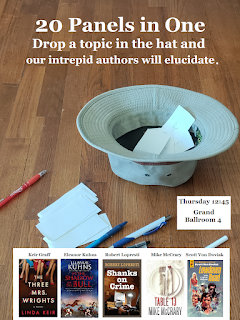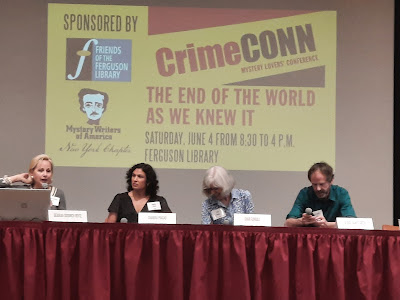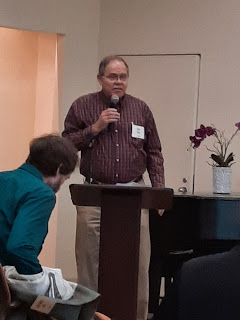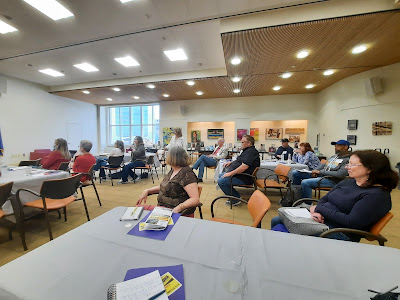Next week was supposed to be the
Bouchercon in Sacramento. Alas, it had to had to move to virtual due to
you-know-what. Some of you are no doubt mourning for all the panels you
won't get to attend in person, the bars you won't get to close, etc.
I
can't help you with the bars, but maybe I can cause you to miss the
panels a little less. Last year I wrote a play inspired by many panels I
attended at mystery, science fiction, and library conferences. I
present it here for your amusement. (And by the way, if anyone wants to
perform it... contact me.)
 |
| Jewish Noir panel, Raleigh Bouchercon* |
THE INSPIRATION PANEL
The
stage is set for a typical conference panel: two tables together
lengthwise, covered with black tablecloths. Water pitchers and five
glasses. Three microphones. Five chairs behind.
EVE walks onto
the stage, with a great sense of purpose. She is forty, dressed
flashily, but not expensively. She carries five name tents which she
carefully places on the tables. From left to right they read: EVE
BROCKHURST, CHARLES LEMMON, DEBORAH DRAKE, BILL FONTANA, AMY KITE.
As
EVE is going around the table to her seat DEBORAH arrives. She is in
her thirties, dressed in business attire. She reads the tents,
stiffens, and then switches her tent with CHARLES’. As she comes around
to her seat the others arrive, read the tents, and take their places.
After a beat EVE looks down the line, nods at the panelists and then smiles at the audience.
EVE
Welcome,
everyone! Have you been enjoying our annual writer’s conference?
Good, good! This is the Inspiration Panel, just in case you boarded the
wrong flight.
(She laughs at her own joke.) My name is Eve Brockhurst
and I am the author of six books of poetry, including
The Falling of
the Dew, which our local newspaper called “remarkably sincere.” The
fact is, I was surprised to be asked to moderate a panel, even one as
distinguished as this. I figured the committee would need me to speak
on the Poetry Panel, or the Nature Panel. Or even the Marketing Panel.
(Brightening by sheer will power.) But Fraser, our dear director, told
me that what he needed most was a strong personality who could keep
these ferocious characters in line!
 |
| Readers Recommends panel, Toronto Bouchercon |
|
She gestures at her panel.
DEBORAH looks irritated.
CHARLES is slumped in his seat. He is sixty years old and wears a sports coat with no tie.
BILL is all coiled energy. He is in his thirties, dressed in business casual.
AMY is glowingly happy. She is in her late twenties and dressed younger.
EVE
But
that’s more than enough about me. It’s time to introduce our wonderful
panelists who will inform and, dare I say it, inspire you today. First
on my left is Charles Lemmon. He is-
She looks left and
realizes for the first time that DEBORAH is sitting next to her. She
does a quick check down the line to see that everyone else is there.
EVE
Whoops!
My mistake. Someone did a little shuffle on me.
(She sorts her
notes.) First in line is Deborah Drake, the author of the new romance
novel—
DEBORAH
Women’s fiction.
EVE
Excuse me?
DEBORAH
Women’s
fiction. It’s about real-life problems. Not the kind you can solve by
going to bed with a man whose chest size is higher than his IQ.
EVE
O-kay. I can see you have a lot on your mind today. Deborah’s woman’s fiction -- Woman’s?
 |
Short story panel, Bouchercon 2017
|
DEBORAH
Women’s.
EVE
Thanks.
It’s about a woman suffering from Reynaud’s Syndrome and it’s called
The Girl With Cold Fingers. The first time I met Deborah was at a
conference just like this three or four years ago. She came up after a
panel to tell me how much she had enjoyed my book
The Dancing of the
Leaves, and I complimented her on her taste. It’s so wonderful to see a
person one has mentored becoming a success. Deborah, our subject is
inspiration. In general, what inspires you?
DEBORAH
Great
question, Eve. I find that there are sparks all around if you know how
to look for them. I’m thinking right now that my next book might be
about a woman with a stalker, maybe a former lover who is too
self-centered and frankly too thick to take no for an answer.
BILL is getting more and more agitated.
EVE
Well,
that is certainly the sort of real-life problem many of us women have
had to face. Is this based your personal experience or something you’ve
heard about or…
DEBORAH
As you said we all face this sort of
thing from time to time. Men who think they have a right to your
attention, who don’t understand when they are not wanted—
BILL
What about the men who have been led on?
DEBORAH
Sometimes a man simply refuses to—
EVE
Just a moment, dear. Bill – this is Bill Fontana, everyone – You had something to add?
BILL
I
just think a writer needs to look at all sides. Modern readers don’t
want set pieces with cardboard characters where one person is all right
and the other is all wrong. If you’re writing for grown-ups characters
need to be nuanced.
DEBORAH
In your latest book the villain tried to strangle a kitten. How nuanced is that?
EVE
Bill, you’ll have your chance. Deborah, do you want to finish your thought?
DEBORAH
That would be nice, wouldn’t it?
EVE
I’m sure. Our next panelist
(DEBORAH does a doubletake.) is my dear friend, one of our most distinguished, most senior, a veritable elder statesman-
CHARLES
Please! I’m not dead yet.
EVE
Of
course not. I just wanted to point out that you have written so many
books. Even more than my six volumes of poetry. Charles Lemmon, your
most recent book is historical fiction,
The Battle of Sattleford Creek.
What’s it about?
CHARLES
(Pause.) It’s about the Battle of Sattleford Creek.
EVE
I
might have guessed that, I suppose. So many titles are ironic these
days, don’t you think? My book
The Fire Sonnets contains no sonnets,
and never mentions fire! I suppose that’s why the critics found it so
surprising. One of them said “Eve Brockhurst has-”
CHARLES
Eve?
EVE
Yes?
CHARLES
How are we doing on time?
EVE
Good
point. Charles, at this place in your long career, how do you still
manage to find inspiration? What moves you to keep writing?
CHARLES
The credit card companies. Something moves them to send me bills.
EVE
Oh, come now. Do you really mean you are only writing for the money?
CHARLES
I’d
better not be, because there’s precious little of it. And security,
don’t make me laugh. You teach English at the college, don’t you?
EVE
I do. I have the honor of opening up the minds and hearts of—
CHARLES
You
can get tenure. Then you have work for the rest of your life if you
want it. What I wouldn’t give for that. A publisher can kick you out in
the snow after you give them the best years of your life.
BILL
Wow, that is one bad cliché.
CHARLES
Shut up, Bill.
DEBORAH
I’m glad I’m not the only one he interrupts.
EVE
Actually. I’m an adjunct professor. No tenure, I’m afraid.
CHARLES
Then
you’re in the same boat as us professional writers. I don’t know how a
publisher can sleep at night, when they fire an editor you’ve been
working with for – well, a long time, and suddenly you’re an orphan and
no one wants to promote your book because the last guy picked it.
EVE
So do you find that—
CHARLES
No
ads. No tours. No publicity. And you know damn well that when the
book doesn’t sell, they’ll say it’s the fault of the writing. Never the
publisher’s, oh no. I might as well give up on quality and start
self-publishing crap.
EVE
Now, come on, Charles! That attitude is very old-fashioned.
CHARLES
Don’t call me that!
EVE
Some of the best, most original work coming out today is self-published. My fourth book--
BILL
And a lot of the worst stinkers, too.
DEBORAH
You’d know about that.
BILL
Oh, I’d forgotten. Men aren’t allowed to talk at this panel. Go right ahead.
EVE
Come on, Bill. We value everyone’s opinion.
BILL
Hell of a way of showing it.
DEBORAH
Bill isn’t very good at taking cues, I’m afraid. At understanding what people are trying to tell him.
EVE
All right, Bill. Since you’re so eager to talk, tell us. How do you find inspiration?
BILL
That’s a stupid question, Eve. Isn’t it really just the old cliché: how do you find your ideas?
 |
Short stories panel at Left Coast Crime, Vancouver
|
DEBORAH
See? He doesn’t listen.
BILL
Not so, Deborah! A good writer, a great writer, is always listening. That’s how he comes up with dialog that sounds true.
EVE
So you get your inspiration from the people around you…
BILL
That’s
right. And I get so much more. Like insight into personality. How a
person will say one thing and mean something completely different. For
example, maybe they’ll claim for months that they want to leave their
husband and start a new life, but when their lover offers to take them
up on it, it turns out they were just teasing him along—
DEBORAH
And this is your idea of honest observation? No wonder
Kirkus hated your last book.
CHARLES
Kirkus hated
everybody’s last book.
EVE
You
know, I think we’ve been neglecting one of our panelists. Amy Kite is a
fresh new face on our city’s literary scene. She is the author of
The
Dragons of Zanzanook—
AMY
(Correcting the pronunciation) Zanzanook.
EVE
Sorry! Her book is a fantasy novel which has attracted major support from the publisher. There’s an ad in the
Times.
CHARLES
Oh my God.
EVE
An author’s tour.
CHARLES moans.
EVE
And I believe you are booked on one of the morning shows next week. Is that right?
AMY
Two, actually.
CHARLES
Jesus.
EVE
Sorry. I must have missed one. Let’s talk about what inspires you…
AMY
Thank
you so much, Eve. I just want to say how inspired I feel simply by
being here with all of you today. What an honor! This is my first time
at a writer’s conference, you know, and here I am with Charles Lemmon!
I’ve been reading his books since I was a little girl.
CHARLES
Well, that’s wonderful. You young whippersnapper.
AMY
And Deborah, what was the name of your novel about the girl with Irritable Bowel Syndrome?
DEBORAH
Twists and Turns.
AMY
Yes! My mother loved that one!
BILL
Oh, I can hardly wait.
AMY
Mr. Fontana.
CHARLES
Here it comes.
AMY
When
I needed a break from writing my book I would read your novel in which
the psychotherapist turns out to be the serial killer.
BILL
Which one? I wrote two of those.
AMY
Three actually.
BILL
I didn’t… Oh yeah.
CHARLES
And there it is.
 |
Setting as Character panel, Left Coast Crime, Vancouver
|
AMY
I’m afraid I don’t remember which one I read most recently.
CHARLES
Boom.
BILL
Let’s not forget our moderator, Amy. What do you think of Eve’s poetry?
AMY
I’m afraid I haven’t read it yet.
EVE
You probably don’t read poetry. So few young people do these days.
AMY
Oh, but I do! I must get around to yours.
BILL
Yes. Do get around to it.
EVE
Well, that’s very sweet, Amy. Let’s start another round. Deborah, what is the inspiration for the book you’re working on now?
DEBORAH
We covered that, remember? Stalker?
EVE
Oh. Right.
(Checking her notes.) Well, what inspired you to start writing in the first place?
DEBORAH
I’d say it was Greg. My darling husband.
BILL
Oh, brother.
DEBORAH
He
is my biggest cheerleader. He knew from the moment we first met that I
was a creative soul and he has always encouraged me to—
BILL
Point of order.
CHARLES
Point of order? Is this a congressional hearing?
EVE
What is it, Bill?
BILL
I’m just wondering if this is the same husband you told me hasn’t opened a book since he got his MBA.
DEBORAH
I never said any such thing. And frankly, I resent you constantly interrupting me.
EVE
Well,
Fraser was certainly right about this group needing a strong hand,
wasn’t he? Deborah, I think it’s wonderful that you have such a
supportive husband.
 |
Ecology Panel, Left Coast Crime, Vancouver
|
DEBORAH
I can’t imagine how I could go on without him. We truly are soulmates.
BILL
I thought you didn’t write romance fiction.
DEBORAH
You know, Bill, I think I know why you model all your villains on your psychotherapists.
EVE
I
think we’re running out of time, so we had better move along. Charles,
can you tell us a little about what inspires your current work in
progress?
CHARLES
I’m not sure I have one, Eve. I write
historical fiction and that means two or three years of research for
each book. By the time my next one is ready my publisher will probably
have burned through five or six editors, and all that any of them care
about are the latest trends. The new expert, straight out of some Ivy
League day care center, wants me to write a Civil War novel with
zombies.
BILL
You’re kidding. Zombies are like five years past their sell-by date.
EVE
And Bill, you already talked about your plans, so any other thoughts about inspiration?
BILL
Great
question! As a thriller writer I’m concerned with revealing the truth
of the human heart. By which I mean that people are totally and
remorselessly evil.
CHARLES
Jesus. I thought zombies were depressing.
BILL
That goes doubly so for the female heart, of course.
CHARLES
And publishers.
EVE
Moving right along. Amy.
AMY
Yes, Eve?
EVE
Let’s get back to your debut novel,
The Dragons of Zanzanook-
AMY
Zanzanook.
EVE
Thank you so much, dear. Would you say you were more inspired by J.R.R. Tolkien or George R.R. Martin?
AMY
(Laughing.) Neither one, Eve. My starting point was my doctoral dissertation on
late medieval monasticism in a military context. I just threw in
dragons to make it commercial.
CHARLES
(Inspired.) Damn it, girl, we have to talk!
 |
Short Story panel, Left Coast Crime 2015
|
AMY
I’d love that!
EVE
Now we have time for a few questions from the-- Oh, I’m told we don’t.
BILL stalks off in disgust.
EVE
Please
join us in the vendors’ room, where all the authors will be happy to
sign their books for you, and I will be happy to take pre-publication
orders for my seventh book of poetry,
Life, Be Not—
The microphone is shut off. She frowns at it.
 Oh, and as for payment, here's a shocker. Reckoning Magazine pays 15 cents per word, Clarkesworld almost as much.
Oh, and as for payment, here's a shocker. Reckoning Magazine pays 15 cents per word, Clarkesworld almost as much. 








.png)














.jpg)
.jpg)























